|
|
|
Sort Order |
|
|
|
Items / Page
|
|
|
|
|
|
|
| Srl | Item |
| 1 |
ID:
137798
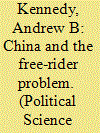

|
|
|
|
|
| Summary/Abstract |
IS CHINA PULLING ITS WEIGHT IN THE INTERNATIONAL SYSTEM? In recent years, China has increased its contribution to United Nations peacekeeping, raised its foreign aid to impoverished countries, and made significant commitments to global arms control initiatives.1 Even so, a rising chorus of voices has charged that China is “free riding” on cooperation undertaken by the United States and other countries that provides benefits to the wider international community. Calling China a free rider is nothing new; scholars described China as free riding on nuclear arms control agreements and international environmental cooperation as early as the 1990s.2 Yet with the United States beset by financial and economic woes in recent years, allegations that Beijing free rides on the United States and other countries have grown more frequent and more impatient. Whether the issue is fighting terrorism or preventing nuclear proliferation, it has become routine—particularly in the United States—to complain that China is not doing enough to support international cooperation.3 The number of articles containing both of the terms “China” and “free rider” in the Factiva database, for example, increased from an average of 39 per year from 2005 to 2009 to 75 per year from 2010 to 2013. Chinese observers, meanwhile, argue among themselves whether China free rides (da bian che) on the collective action of other states.4 Some agree that China should be seen as a free rider, at least in some areas.5 Other Chinese writers disagree and reject the notion that China should take on “even more responsibility” for global governance.
|
|
|
|
|
|
|
|
|
|
|
|
|
|
|
|
| 2 |
ID:
124053
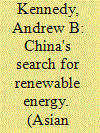

|
|
|
|
|
| Publication |
2013.
|
| Summary/Abstract |
The enthusiasm of Chinese leaders for renewable energy is infused with a pragmatic variant of techno-nationalist ideology. In keeping with this outlook, Beijing supports Chinese wind and solar firms, but it typically proves flexible when important economic partners challenge such policies.
|
|
|
|
|
|
|
|
|
|
|
|
|
|
|
|
| 3 |
ID:
160140
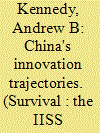

|
|
|
|
|
| Summary/Abstract |
Critical features of China's innovation landscape in science and technology remain relatively weak. But in other areas, China is developing with remarkable speed.
|
|
|
|
|
|
|
|
|
|
|
|
|
|
|
|
| 4 |
ID:
107651
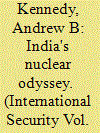

|
|
|
|
|
| Publication |
2011.
|
| Summary/Abstract |
Why did India merely flirt with nuclear weapons in the 1960s and 1970s only to emerge as a nuclear power in the 1990s? Although a variety of factors informed India's prolonged restraint and subsequent breakthrough, new evidence indicates that India's "nuclear odyssey" can be understood as a function of Indian leaders' ability to secure their country through nonmilitary means, particularly implicit nuclear umbrellas and international institutions. In the 1960s and 1970s, India was relatively successful in this regard as it sought and received implicit support from the superpowers against China. This success, in turn, made acquiring the bomb a less pressing question. At the end of the Cold War, however, nonmilitary measures ceased to be viable for India. In the late 1980s, waning Soviet support and the failure of Rajiv Gandhi's diplomatic initiatives led to the creation of India's de facto nuclear arsenal. In the 1990s, India developed a more overt capability, not simply because the pro-bomb Bharatiya Janata Party came to power, but also because its external backing had vanished and because its efforts to improve its security through diplomacy proved unsuccessful.
|
|
|
|
|
|
|
|
|
|
|
|
|
|
|
|
| 5 |
ID:
137215


|
|
|
|
|
| Summary/Abstract |
Are China and India emerging as innovative technological powerhouses in the twenty-first century? This essay reviews the interdisciplinary debate that has been inspired by this question in recent years. It begins by considering recent studies that are relatively impressed with China's and India's recent accomplishments and potential in this regard. Next, it reviews works that are less impressed with their track records and prospects. It then considers a series of more equivocal studies that remain more or less undecided about China's and India's technological trajectories. The final section evaluates the debate as a whole and proposes new directions for scholarship in this field.
|
|
|
|
|
|
|
|
|
|
|
|
|
|
|
|
| 6 |
ID:
188806
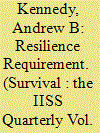

|
|
|
|
|
| Summary/Abstract |
The United States and its partners have arrived at a critical crossroads in their relations with China – and with one another – in the realm of high technology. Some degree of high-tech decoupling between the two sides is already under way, and recent events suggest this trend is accelerating. Combined efforts to bolster their collective resilience in the face of China’s rise remain inadequate. Going forward, much greater investment in resilience is required, including measures to absorb threatening Chinese actions and to adapt and transform in response to China’s growing technological prowess. While this will call for considerable acumen and effort on the part of like-minded governments, greater resilience would afford them renewed solidarity and enriched opportunities to sustain technological leadership in the future.
|
|
|
|
|
|
|
|
|
|
|
|
|
|
|
|
| 7 |
ID:
186106


|
|
|
|
|
| Summary/Abstract |
Technological innovation has emerged as an important site of globalization in recent decades. Yet it is unclear what the future holds for this new form of collaboration, given the spectre of high-tech “decoupling” between the United States and China. This article explores the role that China has come to play in transnational innovation linkages, in an effort to ascertain what is at stake. We find that China has become a key player in some respects, while in others it remains relatively marginal. Moreover, we find that in the arenas where China is most prominent – as a player in brain circulation and as a partner in basic science – China’s participation has had important benefits for other countries, particularly the United States.
|
|
|
|
|
|
|
|
|
|
|
|
|
|
|
|
| 8 |
ID:
152856
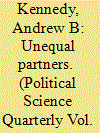

|
|
|
|
|
| Summary/Abstract |
ANDREW B. KENNEDY argues that the globalization of research and development has generated an interdependence among the United States, China, and India, but such that generally favors Washington. Nonetheless, several constraints make it difficult for the U.S. government to exploit this potential.
|
|
|
|
|
|
|
|
|
|
|
|
|
|
|
|
|
|
|
|
|